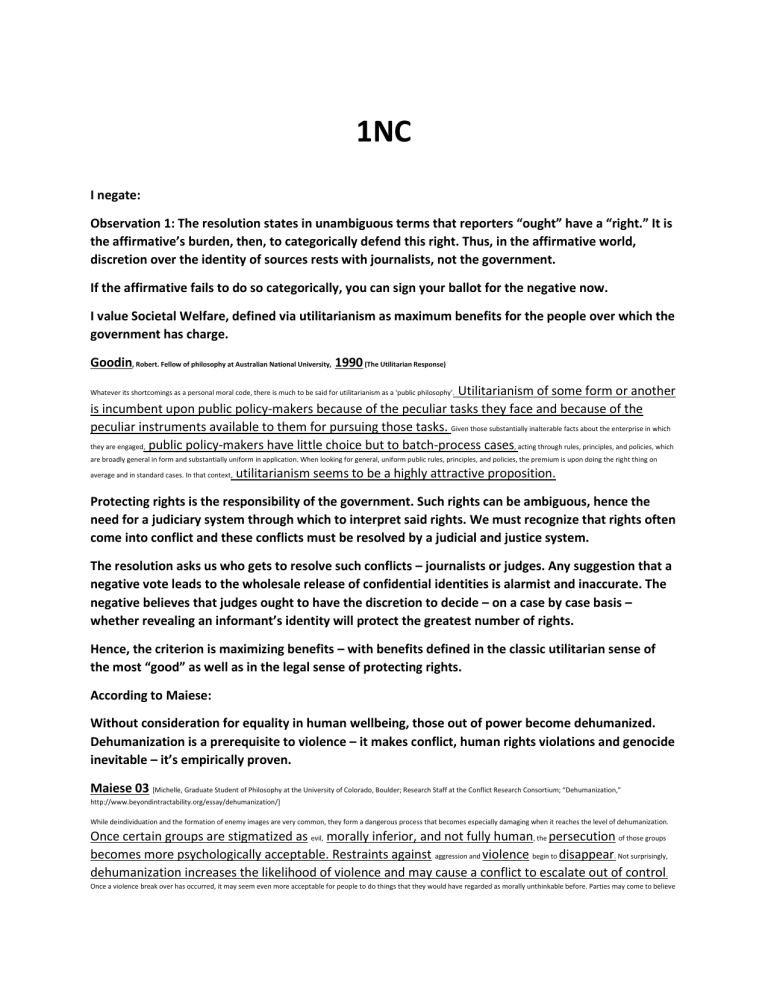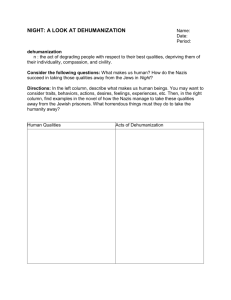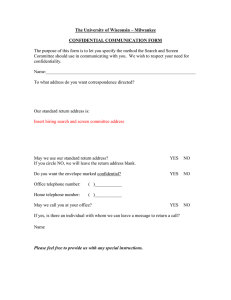NEG Confidential Sources K's comments
advertisement

1NC I negate: Observation 1: The resolution states in unambiguous terms that reporters “ought” have a “right.” It is the affirmative’s burden, then, to categorically defend this right. Thus, in the affirmative world, discretion over the identity of sources rests with journalists, not the government. If the affirmative fails to do so categorically, you can sign your ballot for the negative now. I value Societal Welfare, defined via utilitarianism as maximum benefits for the people over which the government has charge. Goodin, Robert. Fellow of philosophy at Australian National University, 1990 (The Utilitarian Response) Utilitarianism of some form or another is incumbent upon public policy-makers because of the peculiar tasks they face and because of the peculiar instruments available to them for pursuing those tasks. Given those substantially inalterable facts about the enterprise in which they are engaged, public policy-makers have little choice but to batch-process cases, acting through rules, principles, and policies, which Whatever its shortcomings as a personal moral code, there is much to be said for utilitarianism as a ‘public philosophy’. are broadly general in form and substantially uniform in application. When looking for general, uniform public rules, principles, and policies, the premium is upon doing the right thing on average and in standard cases. In that context, utilitarianism seems to be a highly attractive proposition. Protecting rights is the responsibility of the government. Such rights can be ambiguous, hence the need for a judiciary system through which to interpret said rights. We must recognize that rights often come into conflict and these conflicts must be resolved by a judicial and justice system. The resolution asks us who gets to resolve such conflicts – journalists or judges. Any suggestion that a negative vote leads to the wholesale release of confidential identities is alarmist and inaccurate. The negative believes that judges ought to have the discretion to decide – on a case by case basis – whether revealing an informant’s identity will protect the greatest number of rights. Hence, the criterion is maximizing benefits – with benefits defined in the classic utilitarian sense of the most “good” as well as in the legal sense of protecting rights. According to Maiese: Without consideration for equality in human wellbeing, those out of power become dehumanized. Dehumanization is a prerequisite to violence – it makes conflict, human rights violations and genocide inevitable – it’s empirically proven. Maiese 03 [Michelle, Graduate Student of Philosophy at the University of Colorado, Boulder; Research Staff at the Conflict Research Consortium; “Dehumanization,” http://www.beyondintractability.org/essay/dehumanization/] While deindividuation and the formation of enemy images are very common, they form a dangerous process that becomes especially damaging when it reaches the level of dehumanization. Once certain groups are stigmatized as evil, morally inferior, and not fully human, the persecution of those groups becomes more psychologically acceptable. Restraints against aggression and violence begin to disappear. Not surprisingly, dehumanization increases the likelihood of violence and may cause a conflict to escalate out of control. Once a violence break over has occurred, it may seem even more acceptable for people to do things that they would have regarded as morally unthinkable before. Parties may come to believe destruction of the other side is necessary, and pursue an overwhelming victory that will cause one's opponent to simply disappear. This sort of into-thesea framing can cause lasting damage to relationships between the conflicting parties, making it more difficult to solve their underlying problems and leading to the loss of more innocent lives. Indeed, dehumanization often paves the way for human rights violations, war crimes, and genocide. For example, in WWII, the dehumanization of the Jews ultimately led to the destruction of millions of people. [9] Similar atrocities have occurred in Rwanda, Cambodia, and the former Yugoslavia. that Maiese tells us that we must consider humanity in whole – weighing rights of privacy and rights of safety and life in tandem. Any one-size-fits-all policy, as advocated by the affirmative, runs the risk of ignoring public interest and consequently dehumanizing the citizenry. Contention 1 – Historical instances where terrorist attacks could have been prevented if knowing the identity of a confidential source. Confidential sources are crucial for preventing imminent acts of terrorism. Strasbourg, 2002 [“GUIDELINES ON HUMAN RIGHTS AND THE FIGHT AGAINST TERRORISM” by Strasbourg, July 2002 https://www.coe.int/t/dlapil/cahdi/Source/Docs2002/H_2002_4E.pdf ] The Court also accepted that the use of confidential information is essential in combating terrorist violence and the threat that it poses on citizens and to democratic society as a whole: “The Court would firstly reiterate its recognition that the use of confidential information is essential in combating terrorist violence and the threat that organized terrorism poses to the lives of citizens and to democratic society as a whole (see also the Klass and Others v. Germany judgment of 6 September 1978, Series A no. 28, p. 23, para. 48). This does not mean, however, that the investigating authorities have carte blanche under Article 5 (art. 5) to arrest suspects for questioning, free from effective control by the domestic courts or by the Convention supervisory institutions, whenever they choose to assert that terrorism is involved (ibid., p. 23, para. 49). Contention 2 – It is sometimes necessary for public safety, that confidential sources be known. Confidential sources are imperative to have for the purpose for detaining a foreign power. Perry, 2008 [“PROTECTING INDIVIDUAL PRIVACY IN THE STRUGGLE AGAINST TERRORISTS” by WILLIAM J. PERRY, 2008 https://www.nap.edu/read/12452/chapter/5 ] The U.S. Congress has also changed laws that guaranteed confidentiality in order to gain access to individual information collected under guarantees. For example, Section 508 of the USA Patriot Act, passed in 2001, allows the U.S. Department of Justice (DOJ) to gain access to individual information originally collected by the National Center for Education Statistics under a pledge of confidentiality. In earlier times, the War Powers Act of 1942 retrospectively overrode the confidentiality provisions of the Census Bureau, and it is now known that bureau officials shared individually identifiable census information with other government agencies for the purposes of detaining foreign nationals. You need to add a contention that details how judges go about deciding these cases, so that you can give the judge an example of a judge acting responsibly to protect rights.

